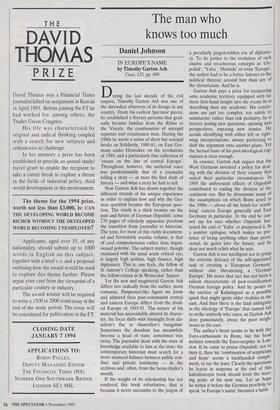The man who knows too much
Daniel Johnson
IN EUROPE'S NAME by Timothy Garton Ash Caoe, £25, pp. 680 During the last decade of the evil empire, Timothy Garton Ash was one of the shrewdest observers of its dotage in any country. From his earliest Spectator pieces, he established a literary persona that grad- ually became familiar from the Rhine to the Vistula: the combination of intrepid reporter and renaissance man. During the 1980s he wrote a series of short but seminal books on Solidarity, 1980-81; on East Ger- many under Honecker; on the revolutions of 1989; and a particularly fine collection of 'essays on the fate of central Europe'. Throughout, however, the authorial voice was predominantly that of a journalist telling a story — at most the first draft of history — and what a story he had to tell.
Now Garton Ash has drawn together the different strands of his unique experience in order to explain how and why the Ger- man question became the European ques- tion. The result is a thick treatise on the past and future of German Ostpolitik: some 270 pages of scholarly apparatus proclaim the transition from journalist to historian. The tone, for most of this richly document- ed and formidably erudite volume, is that of cool comprehension rather than impas- sioned polemic. The subject matter, though examined with his usual acute critical eye, is largely high politics, high finance, high diplomacy. This is, one feels, the fellow of St Antony's College speaking, rather than the fellow-citizen in St Wenceslas' Square.
Yet the new and magisterial Garton Ash differs less radically from the earlier, more romantic, Pimpernel-like figure we knew and admired than post-communist central and eastern Europe differs from the divid- ed Europe of 1945-91. The-nature of his material has unavoidably altered its charac- ter: the focus shifts with hindsight from dis- sident's flat to chancellor's bungalow. Sometimes the dissident has meanwhile become a head of state; sometimes vice versa. The journalist deals with the state of knowledge available to him at the time; the contemporary historian must search for a more nuanced balance between public con- duct and private testimony — in the archives and, often, from the horse-trader's mouth.
If the weight of its scholarship has not rendered this book rebarbative, that is because it never succumbs to the jargon of
a peculiarly jargon-ridden era of diploma- cy. To do justice to the evolution of such elusive and treacherous concepts as `Ost- politik', 'Yalta', 'Helsinki' or even 'Europe', the author had to be a better listener to the political rhetoric around him than any of the rhetoricians. And he is.
Garton Ash pays a price for trespassing onto academic territory equipped with far more first-hand insight into the events he is describing than any academic. His conclu- sions are just too complex, too subtle to summarise: rather than risk pedantry, he is forever posing new questions, opening new perspectives, exposing new ironies. He avoids identifying with either left or right- wing interpretations, always preferring to shift the argument onto another plane. Yet the factual basis of his post-ideological cog- itations is clear enough.
In essence, Garton Ash argues that the West Germans invented a policy for deal- ing with the division of their country that suited their particular circumstances. In 1989 the unforeseen effects of Ostpolitik contributed to ending the division of the continent too. But he denounces many of the assumptions on which Bonn acted m the 1980s — above all the fetish for 'stabil- ising' eastern Europe generally and East Germany in particular. In the end he can- not say for sure whether Ostpolitik has- tened the end of 'Yalta' or postponed it. In a sombre epilogue, which makes no pre- tence of being anything other than provi- sional, he gazes into the future; and he does not much relish what he sees.
Garton Ash is too intelligent not to grasp the extreme delicacy of the self-appointed task of creating a 'European Germany without also threatening a 'German Europe'. He notes that tact has not been a salient characteristic of post-reunification German foreign policy. And he points to the enclave of Kaliningrad as a possible spark that might ignite older rivalries in the east. And then there is the fatal ambignitY in the ideology of 'Europe' that cannot fail to strike anybody who cares, as Garton Ash does passionately, about the poor neigh- bours to the east.
The author's heart seems to be with the Euro-enthusiasts in Bonn, but his head inclines towards the Euro-sceptics in Lon- don. If he came to praise Ostpolitik, not to bury it, then his 'combination of scepticism and hope' seems a backhanded compli- ment, to say the least. Clearly the questions he leaves in suspense at the end of this kaleidoscopic book should form the start- ing point of his next one. Let us hope he writes it before the German proclivity to speak 'in Europe's name' becomes a habit.










































































 Previous page
Previous page